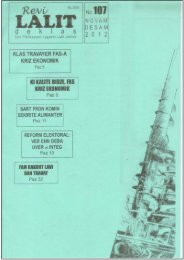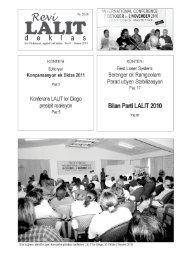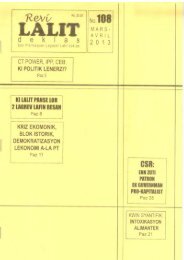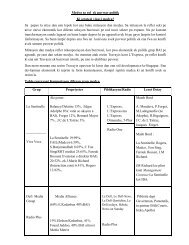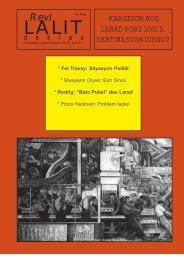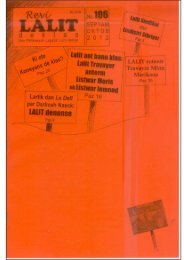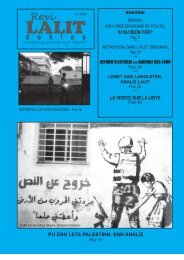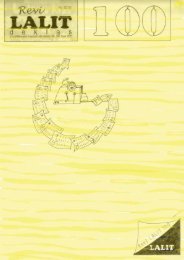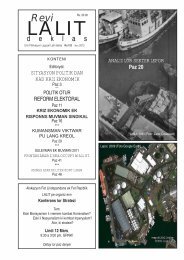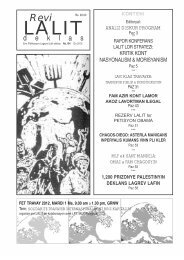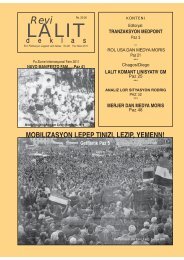Against communalism of the best-loser system - Lalit Mauritius
Against communalism of the best-loser system - Lalit Mauritius
Against communalism of the best-loser system - Lalit Mauritius
You also want an ePaper? Increase the reach of your titles
YUMPU automatically turns print PDFs into web optimized ePapers that Google loves.
mind at <strong>the</strong> time he/she wishes to represent a constituency in Parliament. To our great shame,<br />
<strong>the</strong> First Schedule insists o<strong>the</strong>rwise. The candidates are classified into four possible categories.<br />
Its section 3 (4) extends <strong>the</strong> infamy <strong>of</strong> Section 3 (1) to <strong>the</strong> entire people <strong>of</strong> <strong>Mauritius</strong>. Here it is<br />
in extenso :<br />
“For <strong>the</strong> purposes <strong>of</strong> this Schedule, <strong>the</strong> population <strong>of</strong> <strong>Mauritius</strong> shall be regarded as including a<br />
Hindu community, a Muslim community and a Sino-Mauritian community; and every person<br />
who does not appear, from his way <strong>of</strong> life, to belong to one or o<strong>the</strong>r <strong>of</strong> those 3 communities<br />
shall be regarded as belonging to <strong>the</strong> General Population, which shall itself be regarded as a<br />
fourth Community.”<br />
The first obvious observation to be made is devastating: when it comes to elect our Government,<br />
our Opposition and o<strong>the</strong>r politicians to represent us in Parliament, <strong>the</strong> Constitution allows its<br />
First Schedule to do away with our political responsibility, our political dignity and our<br />
political integrity as citizens.<br />
The representation <strong>of</strong> <strong>the</strong> people in Parliament, <strong>the</strong> choice <strong>of</strong> those who will govern <strong>the</strong> country<br />
is deliberately and heavily polluted by <strong>communalism</strong>. We, <strong>the</strong> people, are reduced, whe<strong>the</strong>r we<br />
like it or not, to beings which must perforce “belong” to one <strong>of</strong> 4 categories. Some <strong>of</strong> us are<br />
defined in terms <strong>of</strong> our religion: Hindu or Muslim. O<strong>the</strong>rs in terms <strong>of</strong> <strong>the</strong> place <strong>of</strong> origin <strong>of</strong> our<br />
putative ancestors: a Sino-Mauritian presumably comes from China. After this constitutional<br />
massacre <strong>of</strong> <strong>the</strong> integrity <strong>of</strong> our Mauritian citizenship, what is left <strong>of</strong> us is unceremoniously<br />
packed in <strong>the</strong> motley bag <strong>of</strong> “General Population”.<br />
Is this acceptable in 1995? Was it ever really acceptable? Will <strong>the</strong> people still accept it in <strong>the</strong><br />
year 2000? Will our youth continue to tolerate <strong>the</strong> intolerable?<br />
For how much longer will <strong>the</strong> people <strong>of</strong> <strong>Mauritius</strong>, <strong>the</strong> political parties and <strong>the</strong> Supreme Court,<br />
<strong>the</strong> Guardian <strong>of</strong> <strong>the</strong> Constitution, tolerate and subject <strong>the</strong>mselves to such dangerous political<br />
indignities and fragmentation?<br />
We may pause here to note that <strong>the</strong> <strong>Lalit</strong> Party is a courageous exception. It must be<br />
commended for its philosophical and political objection to such communal classification. In<br />
1983 and in 1987, indeed whenever it participates in elections, its candidates choose a<br />
community from a hat (probably <strong>the</strong> safest place to handle such a concept). The 4 categories<br />
imposed in <strong>the</strong> First schedule are written down on a piece <strong>of</strong> paper, put in a hat and <strong>the</strong><br />
candidates pick one out, any one, which <strong>the</strong>y use to fill in <strong>the</strong>ir Nomination Papers.<br />
Such a device is not a mere symbolic gesture. It certainly is more logical when contrasted with<br />
<strong>the</strong> absurdly vague notion <strong>of</strong> “way <strong>of</strong> life” that <strong>the</strong> horrendous Section 3(4) imposes as a method<br />
<strong>of</strong> classification upon <strong>the</strong> Judges who are given powers to determine in which communal<br />
category a candidate is to be confined. If each <strong>of</strong> <strong>the</strong> 4 categories is supposed to have a distinct<br />
“way <strong>of</strong> life” that can be legally defined, we may well ask what has happened to <strong>the</strong> “Mauritian<br />
way <strong>of</strong> life” we hear a lot about. Why is it not mentioned in <strong>the</strong> First Schedule? Perhaps because<br />
it would establish too clearly <strong>the</strong> reality <strong>of</strong> only one Mauritian electorate.<br />
Section 5 (1) <strong>of</strong> <strong>the</strong> First Schedule confirms bluntly <strong>the</strong> purpose <strong>of</strong> <strong>the</strong> <strong>best</strong> <strong>loser</strong> <strong>system</strong> :<br />
“in order to ensure a fair and adequate representation <strong>of</strong> each community, <strong>the</strong>re shall be 8<br />
seats in <strong>the</strong> Assembly, additional to <strong>the</strong> 62 seats for members representing constituencies.”<br />
This purpose is supposed to be achieved by quantifying each communal category. Yet, this was<br />
done for <strong>the</strong> last time in <strong>the</strong> census <strong>of</strong> 1972. The electorate was asked to identify itself in terms<br />
<strong>of</strong> communal categories. In census carried out in 1982/1983 and again in 1992, <strong>the</strong> electorate<br />
did not have to state any communal category. Candidates to elections, however, still had to<br />
categorise <strong>the</strong>mselves. Thus, <strong>the</strong> outdated figures ga<strong>the</strong>red in 1972 have been used to appoint<br />
<strong>best</strong> <strong>loser</strong>s in all <strong>the</strong> general elections since 1976 onwards. They were last used in 1991, nearly<br />
twenty years later.<br />
Parliamentary democracy is perverted by such absurdities which compound <strong>the</strong> indignities<br />
already mentioned. The Electoral Commission might as well use a large hat to select <strong>the</strong> <strong>best</strong><br />
<strong>loser</strong>s. A sombrero would do. It is much less harmful and less ignoble than <strong>the</strong> communal<br />
quantification and division <strong>of</strong> a whole nation.<br />
The Ma<strong>the</strong>matics <strong>of</strong> Perversion<br />
We will attempt to show step by step how <strong>the</strong> Electoral Commission proceeds to nominate <strong>best</strong><br />
<strong>loser</strong>s after a general election. We will deliberately ignore <strong>the</strong> communal categories used by <strong>the</strong>



